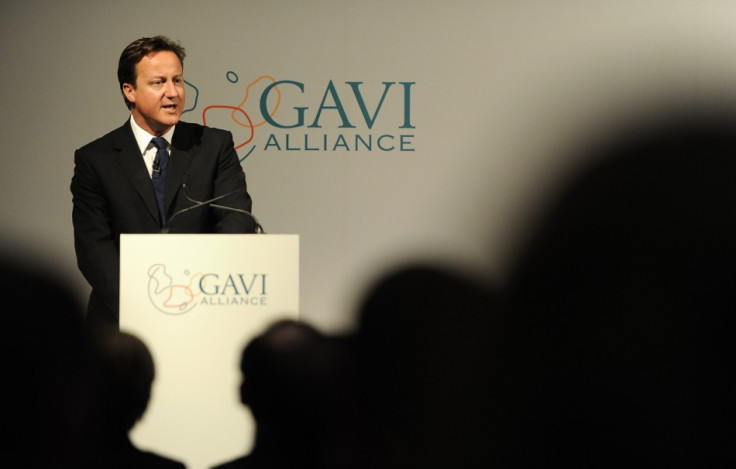Vaccine funding: Cameron announces the UK will provide a further £814m

UK Prime Minister David Cameron has pledged £814m to help vaccinate children around the world against preventable diseases like pneumonia at the Global Alliance for Vaccines and Immunisation (Gavi) conference in London.
He made the announcement at a summit in London where countries are being asked to give an extra £2.3bn ($3.7bn) by 2015 for child vaccines.
Britain will donate an additional £814m to vaccinate more than 80 million children, helping to save an estimated 1.4 million lives from common conditions such as pneumonia and diarrhoea.
The Prime Minister's move comes as the UK has already committed more than any other nation as the total amount of funding comes at an estimated £2bn over 30 years.
"In addition to our existing support for Gavi, we will provide £814m of new funding up to 2015. This will help vaccinate over 80 million children and save 1.4 million lives. That is one child vaccinated every two seconds for five years. It is one child's life saved every two minutes. That is what the money that the British taxpayer is putting in will give."
The conference in London was attended by politicians, charities, private companies and various philanthropists who held talks to plan further funding directed at children in countries too poor to pay for vaccination.
Joining the pledges, tycoon Bill Gates of Microsoft said he would be giving $1bn to help the campaign. By the end of the summit, the conference organisers hope to raise more than £2.3bn in donations.
"In the achievement of vaccine equality this is a very important day" and "I know that the whole image of aid can be saved if people know it's about saving lives" Mr Gates said.
Talking about the vaccines Gates added that "They are very inexpensive, they can protect you for your entire life, so diseases like smallpox that used to kill millions are completely gone because of the vaccine. It's the greatest thing that ever happened in human health. We need to get them out to people and invent some more."
One of the main arguments advanced by the conference relates to the cost-effectiveness of immunisation, as preventing children from being affected by the deceases will also alleviate financial costs dedicated to treatments.
During his address, Mr Cameron said there was a "strong moral case" for keeping pledges Britain had made to the developing world, insisting they remained independent from the country's domestic economic circumstances.
"Today we come together because we have the chance to save another four million lives" before pointing out that the idea of children dying from pneumonia and diarrhoea should be "unthinkable" in 2011. . "To those who say fine but we should put off seeing through those promises to another day because right now we can't afford to help: I say - we can't afford to wait." The Prime Minister added.
Mr Cameron defended the decision to increase overseas aid at a time of such sharp domestic cuts in an article in the Observer. While he acknowledged it may be regarded as a controversial decision, he added it was right both morally and in the national interest to invest in countries "before they become broken", in order to avoid spending far more on the problems that could result.
"If we invest in countries before they get broken, we might not end up spending so much on dealing with the problems, whether that's immigration or new threats to our national security," he said in his speech.
"I actually think that most people in our country want Britain to stand for something in the world, to be something in the world. When I think about what makes me proud of our country, I think of our incredibly brave servicemen and women and of our capabilities as an economic and diplomatic power, but I also think of our sense of duty to help others. That says something about this country and I think it's something we can be proud of."
The Prime Minister also conceded that worries about corruption in overseas aid are legitimate but emphasised on the need to continue providing aid: "I totally get this argument. It's right to be angry when aid is badly spent. Let me tell you: I'm not prepared to see a single penny of hard-earned money wasted on corrupt governments, or badly spent aid. But the answer isn't to walk away from aid. It's to change the way we do development - so that we get real results and real value for money."
Two million under-fives die from pneumonia alone each year despite the existence of a vaccine to protect them.
It is estimated that three times as many children aged under five die from pneumonia and diarrhoea than from malaria and HIV/Aids combined. While new vaccines, able to prevent such deaths are available, many developing countries still cannot afford them.
Commenting on the conference, The Save the Children charity representative said the leaders have a "make-or-break opportunity".
Chief executive Justin Forsyth said: "We are on the cusp of an historic breakthrough that would save millions of lives.
"We have new vaccines to tackle appalling common childhood killers like diarrhoea and more children than ever are getting immunised against illnesses like whooping cough. But without pledges, that incredible progress could stall."
As it was revealed that many countries still struggle to buy the vaccines, the GlaxoSmithKline company announced last week that it will sell a vaccine for diarrhoeal disease at cost price to poorer nations, and some other firms have since made similar moves.
© Copyright IBTimes 2025. All rights reserved.





















